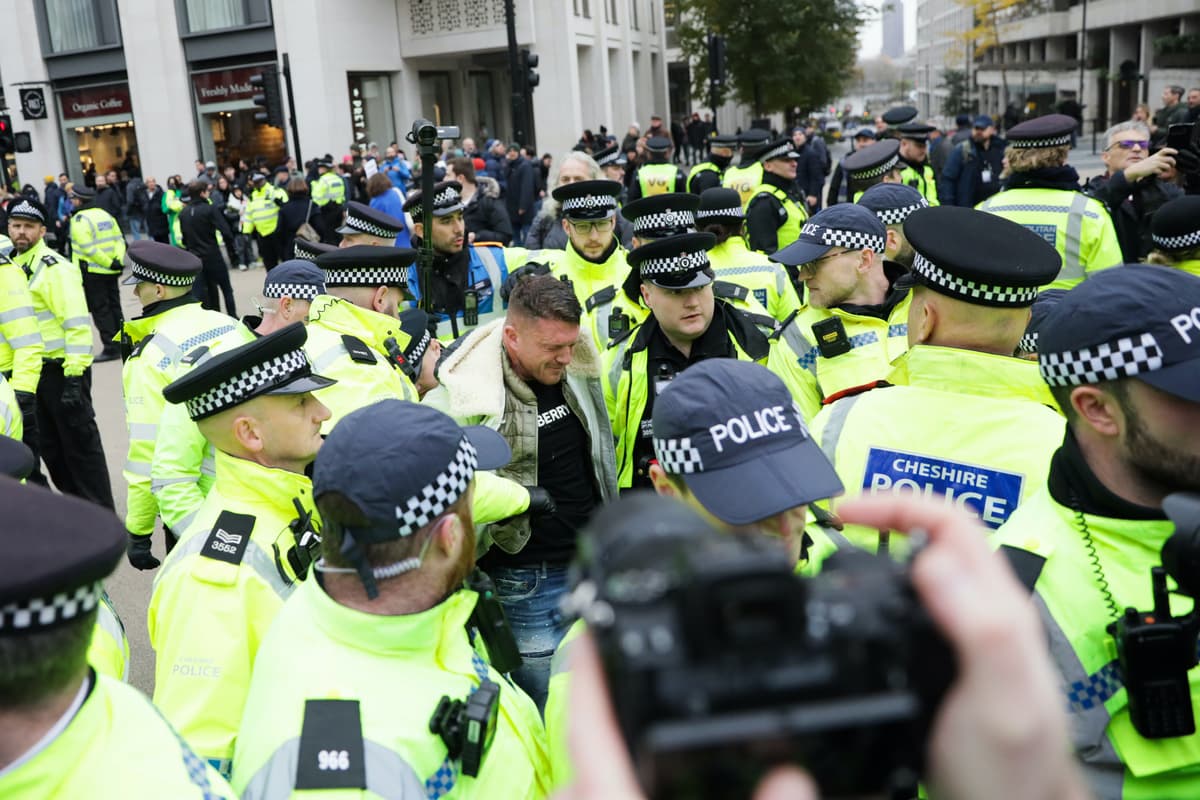London’s Bias Police
Suella Braverman has a point.

A few weeks ago, Britain’s polarizing Home Secretary, Suella Braverman, was asked to resign from the government after she published an unauthorized column in the Times of London. She had already tossed many provocations at the government she worked for, particularly over immigration — which I wrote about in our pages — but this was on the topic of police bias. Namely, she accused London’s Metropolitan Police of playing favorites in handling arrests, cracking down on the right wing, nationalist protesters but going easy on what she called pro-Palestinian “hate marchers,” much as they had three years ago with Black Lives Matter activists who were “allowed to break rules.”
This Sunday, at London’s March Against Antisemitism, we got the best anecdata yet to support Ms. Braverman’s argument in the arrest of Stephen Yaxley-Lennon. Yaxley-Lennon goes by the working-class alias “Tommy Robinson” and is a far-right activist, rabble-rouser, and former leader of the violent, racist English Defense League. However, he didn’t cause any violence here, encourage it, or shout hateful slurs at the rally; he supported the cause of the rally, which was combating antisemitism. His arrest — by a comically large group of police officers — was for failing to comply with Section 35 of the Antisocial Behavior, Crime and Policing Act. This is a law that gives police the power to arrest you if you don’t leave an area when they ask, on the grounds of preventing “antisocial behavior.”
Yet a week earlier, a pro-Palestine crowd rallied outside the offices of the Labour leader, Sir Keir Starmer. They came bearing Iranian flags; said that Hamas is actually controlled by Israel; inferred that the October 7 massacre was done by Israelis, or that it didn’t happen, or that it did and they had it coming; and claimed that Mr. Starmer was being controlled by his “Zionist” wife. For context, though Mr. Starmer is openly atheist, his wife, Victoria Alexander, is Jewish, and their children are being raised in her faith. Soon, the crowd would chant, “From the River to the Sea, Palestine will be Free,” a slogan widely interpreted as calling for the extinction of the Jewish State.
None of these protesters were arrested.

To some, this is a clear demonstration of Ms. Braverman’s argument about bias. Palestinian supporters can spread vicious antisemitism, and the police ignore or excuse them, whereas counterprotesters are arrested on sight. To a degree, this is true — Yaxley-Lennon’s arrest was an injustice and yet another example of my country’s deep unseriousness about freedom of expression and association. The most galling example of this came in 2018, when the Metropolitan Police investigated the future prime minister, Boris Johnson, for a letter he wrote to the Daily Telegraph wittily comparing hijabs to letterboxes. And, for the record, they do.
Yet the issue is more complex than it seems.
To those unfamiliar, pro-Palestinian protests sprang up at London immediately after October 7, growing every weekend, with each protest producing an overwhelming onslaught of antisemitism. Attendees praised jihad, carried flags with a marked resemblance to those of ISIS, held signs with swastikas placed over the Star of David, accused politicians of being bought by Jews, and so forth. “From the River to the Sea” has become a rallying chant.
In response to what Ms. Braverman calls “hate marchers,” the Met Police posted pictures of various signs held by people they would like to interview but said that the ISIS-resembling flags were an expression of faith and that “jihad” has many meanings and encourages tolerance.

During the biggest rally so far, on Armistice Day, more than 300,000 people marched to support the Palestinians, but the police only found a few among the throng worth arresting. The individuals in question shot fireworks directly at police officers. By contrast, the police arrested 126 counter-protesters.
“That’s clear bias!” you may cry. Yet said counter-protesters attacked police officers, injuring several, and were found with weapons on them, including a knife, a baton, and knuckle dusters. Some were heard shouting “Sieg Heil.” This counter-protest was led and organized by Yaxley-Lennon, who didn’t encourage or engage in violence, but has a strong record of doing so in the past. And by record, that is quite literal.
Put simply, Yaxley-Lennon is — by all reasonable definitions — a violent thug. He was jailed in 2005 for kicking a police officer in the head as he lay on the ground; jailed again in 2011 after headbutting a man; jailed again in 2012 for passport fraud; jailed again in 2014 for mortgage fraud; and in 2021, was issued a five-year stalking protection order after shouting abuse outside a journalist’s home and threatening to make a habit of it. Former associates — who, it needn’t be said, are of similarly disreputable character — have accused him of misusing support donations, spending them on female companionship, and Bolivian Marching Powder.
Despite our desire for simple narratives, the issues at play run far deeper, beyond the police and into the political culture of my country. And the solution is for our institutions to act more seriously and for our legal system to codify our freedom of speech.
For example, though the Met’s actions seem biased toward one side, it’s fundamentally a bias toward laziness and an undergraduate understanding of what it means to protect the capital’s renowned multicultural spirit. For example, it’s difficult for police to investigate imams spreading antisemitic conspiracies or arrest protestors praising the “warriors of jihad” without looking like they’re undermining that philosophy, so they don’t. By contrast, it’s easy to go after Yaxley-Lennon at a rally or Mr. Johnson’s pen; and without a First Amendment, they can.
Codifying free expression in British law would help shift this balance. It would save taxpayer money that is currently wasted on investigating writers, arresting tweeters, and going after YouTube comedians. It would put police focus back on the difficult jobs, making the job more rewarding and increasing trust with the public. Finally, it would better protect London’s spirit of multicultural acceptance, as all residents would be treated the same. Yaxley-Lennon should be allowed to share his views, just as the “hate marchers” do.
Those who chant in support of Hamas are an insult to my country, but they have a right to do so unless they get violent. I will also note that, though many on the British right — most notably, the conservative writer Douglas Murray — have called for deportations of such antisemites, this would be a needlessly incendiary, expensive move that would fail to address the issue of poorly vetted immigration. We need to make our immigration system more rigorous, making sure we’re letting in people who respect our norms and actually want to assimilate. This would be another policy that would defang accusations of bias and return Yaxley-Lennon to the irrelevancy he deserves.
Bias isn’t the problem; it’s institutional unseriousness. And frankly, it’s high time our politicians defended our rights to free speech and took their country seriously.

